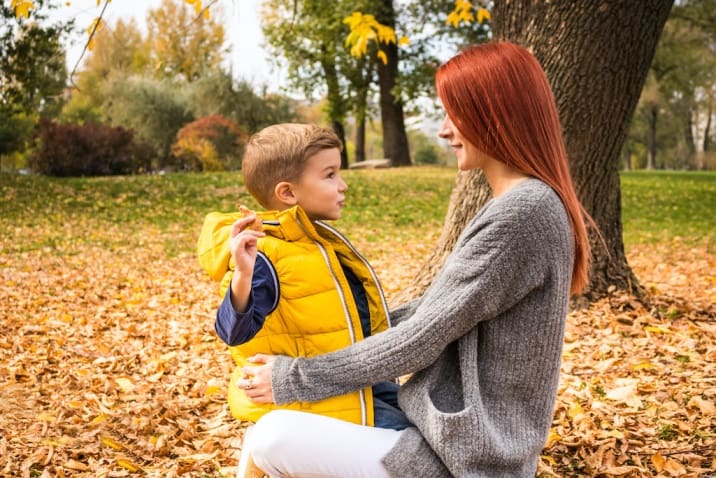Backtalk is one of the most annoying behaviors parents face and feel worried about.
Backtalks can be a normal part of growing up.
But at the moment, as a parent when you are talked back to, it can make you enraged because you feel disrespected.
You might think, “After all that I do for them, this is what I get”.
I am here to say, I get you. Every parent goes through this at some point in time and it is okay.
It is not legitimate to expect kids to be at their best behaviors all the time. And raising obedient kids who don’t speak a word against you (that means they can speak for themselves) isn’t healthy either.
They should learn to assert their personal boundaries and express their emotions. It’s a sign of being a healthy individual.
That being said, it doesn’t mean you have to endure whatever rude things your kids tell you. There are some tricks to reduce backtalk and reduce the need for kids to talk back, which is a far better solution.
Read on to find out more.
WHY ARE BACKTALKS NORMAL?
A backtalk can come to you in verbal as well as in non-verbal forms.
It can be hurtful comments, death stares, and also the relatively harmless and the famous “eye-rolls”.
According to Oxford languages, backtalk is defined as,
Rude or cheeky remarks made in reply to someone in authority.
So, if backtalks are normal, how do we know when it becomes too out of line and when to ignore it.
According to Amy McReady of Positive Parenting Solutions (affiliate link), here we need to apply the litmus test question,
Would it be okay for your child to respond in the same way in front of your friends, co-workers, or your mother-in-law”?
If the answer is NO, we have to work actively on understanding the causes and take preventive or corrective action.

WHY DO KIDS TALK BACK?
There can be many reasons why they talk back. Kids, from a young age, start to test their power and sense of independence on people who are closer to them.
Imagine, if we were always ordered around and asked to follow directions by others, we would feel powerless too.
There are moments when we want to protest and say that “You cannot rule me”.
It’s hard to be a kid who doesn’t have the knowledge or full skills to do things on their own and therefore have to be always told about what they should do.
But as humans, we all have the innate need to exert our independence and positive power. When children don’t get the opportunity to do that, they fight back in some way and that results in backtalk or other rebellious behaviors.
Hence, it is a normal part of growing up.
So what can we do to prevent backtalk?
In one word, lots of positive communication and attention.
In many words, let’s elaborate.
HOW DO YOU GET KIDS TO STOP ANSWERING BACK?
1. GIVE THE POWER BACK TO THEM
It’s when they feel powerless that they want to retaliate to show that “You are not the boss of me”.
If you experience a lot of backtalk from kids, it would be good to take time to examine how you talk to them.
If you are always asking them to do something, or always correcting them, then it means they are getting less positive attention. They might feel less seen and heard.
You can offer lots of opportunities to make choices for kids and pick your battles carefully. Thus kids feel more in power and independent. Their self-esteem grows as a result.
Involve kids in decision-making like, what to have for dinner, which subjects they want to study first, etc.

2. STAY CALM
Kids try to test the boundaries in various ways and backtalk is one of them.
So, when kids roll their eyes or say something that makes you furious, do the opposite. Stay calm. And take control of the situation.
If you lose your calm and become angry, that gives kids exactly what they want.
They know they can get a reaction from you and this will only escalate the situation and also cause more conflict.
Stay calm and move away from the situation if you need to.
Getting into a bad exchange of words with kids here is a bad idea. Hence, find your calm and respond firmly, “That’s a hurtful thing to say, I’d appreciate it you will take your time to calm down and talk to me. I can’t talk to you anymore on this until you take time to cool down.”
And don’t change your mind or give in to their hurtful comments because this will reinforce the behavior and they will use this against you in the future to get what they want.
Therefore pick your battles and stick to the rules you have set.
Related: How to control anger with kids and be a calm mom

3. TRAIN THEM TO TALK RESPECTFULLY
One of the reasons parents get pissed off by kids’ responses is because of the rude tone when they speak or their choice of words.
Kids may pick inappropriate phrases or words by watching movies or Youtube. They don’t know the proper usage of it. That could be one of the reasons they talk back impolitely. And this is more common than we think.
My daughter says something of the sort casually to me and when I express disbelief, she is shocked as well because she genuinely doesn’t know that it is considered rude.
So, teach kids the way to speak respectfully to others and the proper speaking etiquette.
And more importantly, talk to kids respectfully as you would like them to talk to you.
Allow kids to make mistakes too. If they talk back once, it is not the end of the world.
Let them know that this is not a polite way to speak and teach what they can say instead.
Kids learn by imitating. If you are used to speaking sarcastically or making insinuating comments often, kids learn such a way of speaking too.
If not to you, they may practice such a way of speaking to their peers or siblings which also may not always go well.
In fact, it’s okay for kids to have different opinions from you and express how they feel honestly. It’s a part of developing their personality. But the only thing is that they should know to express it in a respectful way.

4. IMPLEMENT BOUNDARIES AND CONSEQUENCES
Let them know about your expectations on speaking politely. Along with that, have consequences for negative behaviors so that they do not repeat them.
For example, if they talked to you rudely and are now demanding something from you, you can say,
“The way you talked to me was impolite. I can’t let you talk to me like that. I can go with your demand when you calm down and do not repeat this again.”
It’s a gentle way of establishing a consequence for their way of talking and letting them understand the mistake they made.
I do not agree with establishing other logical consequences like taking away their screen time or not giving candies because that’s not directly related to the behavior.
When the consequence is not directly related to the behavior, kids would only feel more defiant and angry.
The aim here should be to teach how their way of talking was a mistake.
In my opinion, being not willing to have a conversation if they can’t be polite is a sufficient consequence.

5. TAKE TIME TO CONNECT BEFORE DIRECTING
This is very important to get cooperative behavior from kids and reduce backtalks.
Too often we are in a hurry and we go to kids asking them to do something without trying to look at what they are doing at the moment.
Before asking them to do something, observe what they are doing.
If they are busy drawing or reading a book, try to ask questions like,
“Oh, I see you are reading. What book is it?”
Or,
“Oh, you are making shapes with the kinetic sand? What shape are you trying to make?”
This helps to genuinely connect with them at the moment. This may lead to a small conversation which will only help further in filling their love buckets.
Then if you ask them to do their chore, they will be much more willing to do it and not talk back.
It is also teaching them a respectful way of behavior, because you are respecting their time and what they are doing instead of demanding they stop what they do right at the moment and obey you.
It helps in reducing backtalks because as human beings, we all are vulnerable to bad moods.
And kids tend to talk back when they are already frustrated at something (and may direct those emotions toward you), or if they experience other physically exhausting triggers like hunger, sleepiness, or tiredness.
That’s why examining the situation and connecting first is important. You can tend to the situation thoughtfully and get a better response from them.
Related:
6. ENCOURAGE GOOD BEHAVIOR
With constant training and modeling, you can teach kids how to talk appropriately.
And when they do display good behavior (instead of talking back), encourage it to reinforce the behavior.
eg:
Earlier I saw how you responded calmly to your brother even though he was annoying you. That’s good emotional control.
Or
I saw how you were patient with me earlier when I asked you to do the chores. Thank you!
7. MONITOR WHAT THEY ARE WATCHING
Our responsibility doesn’t end by giving kids a device to kill time. We should always know what shows they are watching.
I personally hate those shows where kids are rewarded with laughter when kids talk back sarcastically and disrespectfully to parents as if it’s the norm.
Let kids know this is not good in real life and restrict such shows.

8. LET THEM SPEAK THEIR MIND
As children grow up, they develop their own tastes and opinions on many topics.
If you want something from them and if they absolutely hate the idea, it’s better to accept the differences and respect their decision.
Expressing different opinions and views need not be considered as talking back unless they are saying it disrespectfully.
If their choice of words is wrong, you can tell them about it. But always be willing to hear what they have to say so as not to close the communication channels with your child forever.
I have noticed how my daughter obliges to non-negotiable tasks (like studying or doing homework) when I give her a chance to express her disinterest. This helps her feel heard and that’s what she wants at the moment.
If I consider everything as backtalk, it might become too frustrating for her to bottle up everything. Now it all comes down to you as a parent to decide what kind of response is okay and what’s not.
But when your family has non-negotiable rules like doing chores or having family rituals, stick with it even if they express discontent.
They can express their lack of interest, and you can make them feel heard. But when you are a parent and you know why it is good for them, you can talk about your viewpoint too.
This helps in teaching them to express discontent to authority in a respectful way.
WHAT TO DO IF THE BACKTALK BEHAVIOR DOESN’T STOP?
Even after repeated warnings, if you see that the behavior is repeating, conduct family meetings.
It’s my favorite way of putting the problem on the table and giving everyone the opportunity to say what is in everyone’s mind.
Family meetings are effective because children get to speak what’s on their minds without being judged. This is important.

Kids may have their own reasons that trigger disrespectful behavior.
Maybe they are going through a hormonal surge, or have problems at school, or they may not be receiving the emotional connection they want from you, etc.
Dive deeply into the issues and conduct an open platform to discuss what’s on their mind and come up with solutions together. You can also teach the expected behavior here.
When it comes to family meetings, it’s better if you start conducting them every once in a while so that they get used to the idea of talking openly to you. It’s better to start when they are young.
But better late than never.
CONCLUSION
Even if backtalks are normal, it’s important to teach respectful behavior to kids and the importance of speaking their minds without hurting others. And hence it is important to teach kids the proper way of setting boundaries and communicative skills.
More reading:
- 11 ways to get kids listen to you the first time you ask
- 16 signs you’re raising a spoiled teenager & how to fix it
- 15 positive discipline techniques to use to discipline kids without breaking their hearts
- 101 questions to ask kids when they are bored to get them talking
- 18 signs of bad parenting (and their bad effects) you’d wish you had known sooner
- List of age-appropriate chores for kids of all ages
- 101 simple calm-down strategies for kids to help them manage big emotions

